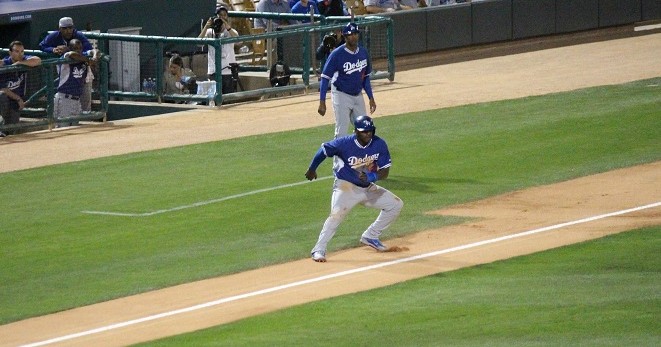
Since the Dodgers departed Australia, a lot has been said about Yasiel Puig‘s demeanor on and off the field. Two baserunning mistakes that Puig made during the series’ concluding game sparked the discussion. During that game, Puig was caught between first and second after a single (which Kershaw did in game one) and was thrown out attempting to advance to third on a wild pitch. These gaffes have resulted in calls for Puig to be benched, and the familiar refrain of “Puig’s mistakes will cost the Dodgers wins” has returned once again.
(The intent of this article is to address Puig’s issues on the field. I’m not in a position to know about off-the-field issues, which have perked up once again.)
While the mistakes on the bases last weekend weren’t great and should be avoided in the future, it’s worth looking at Puig’s baserunning value from last season to add additional context to this discussion. It’s not like Puig making mistakes is something new. Below is a summary of evaluations of Puig’s baserunning value on the three main statistical sites.
Fangraphs
Weighted stolen base runs (wSB): -1.3
Ultimate Baserunning runs (UBR): -2.9
Total Baserunning Runs Above Average: -4.2
Fangraphs breaks down baserunning value into two categories: value added by steals (wSB), and value added by everything else that happens on the bases (UBR). Of the three major statistical websites, Fangraphs has the least favorable view of Puig’s baserunning. Despite that, the value “removed” by Puig on the bases is less than half of a win. Less than three runs were removed by Puig’s non-stolen base “decisions,” which is quantified in UBR.
Baseball Reference
Baserunning Runs Above Average: -2
Baseball reference does not surface their summation methods of baserunning value as clearly as the other sites. Instead, they choose to show only the total value, which is slightly better than what is found on Fangraphs. Baseball Reference’s value shows that Puig only cost the Dodgers 0.2 runs over an average player last year.
Baseball Prospectus
Ground Advancement Runs: +0.63
Stolen Base Runs: -1.00
Air Advancement Runs: -0.08
Hit Advancement Runs: +1.01
Other Advancement Runs: -0.01
Total Baserunning Runs Above Average: +0.6
Baseball Prospectus gives the most detailed breakdown of baserunning value, showing value added by advancement on ground balls, advancement on fly balls, advancement on passed balls (filed under “other”), and stolen bases. Even if stolen bases are included, Baseball Prospectus concludes that Puig added value with his baserunning last season.
—
While Puig’s baserunning value would be higher if he didn’t make as many mistakes, saying that he “costs the team games” on the bases is overly dramatic. The lowest of the three values above assesses him at 4.2 runs below average, and the highest has him slightly above average. The real answer is probably somewhere in the middle. If stolen base value is removed, focusing only on Puig’s decision-making on the basepaths, then his value looks even better.
Given how good Puig was last season, it’s pretty easy to forget that he hasn’t even played in the majors for a full year. He’s only played a season and a half of organized baseball since defecting from Cuba. He’s 23 years old and has reached base fewer than 200 times in his big league career. This level of experience means that he’s going to make mistakes every once in a while. Often times, those mistakes are made up for by taking extra bases and keeping defenders off-balance in other situations.
Even if Puig stopped making all mistakes, his value would not increase by a large amount. The highest baserunning value last season per Baseball Prospectus was Matt Carpenter, with a value of 8.4 runs above average (only 7.8 runs above Puig). Per Fangraphs, the site with the harshest evaluation of Puig’s baserunning, the highest baserunning value last season was Jacoby Ellsbury‘s +11.4 runs. Mike Trout was 8.1 runs above average. Andrew McCutchen was 5.1 runs above average. In the last 10 years, only fourteen rookies have produced baserunning value more than a win more than what Puig produced last season.
It’s easy to be focused on the negatives, but the Dodgers have only played two games this season. It’s too early to determine if Puig’s mistakes in game two were part of a larger pattern or two random events happening close to each other. Calling for Puig to be benched due to these on-field issues is premature, especially given the value that he adds elsewhere.
 Dodgers Digest Los Angeles Dodgers Baseball Blog
Dodgers Digest Los Angeles Dodgers Baseball Blog